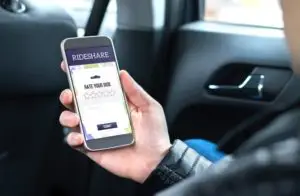
Yes, Uber and Lyft drivers should have insurance coverage. Unlike the drivers of personal vehicles, rideshare drivers often have insurance through their rideshare company in addition to their personal policy.
Rideshare drivers might enjoy additional insurance coverage, but that does not mean an insurance claim is guaranteed to be successful. We can help you build a case to seek compensation from the responsible rideshare driver.
Insurance Provided By Uber and Lyft
Both Uber and Lyft provide their drivers with an array of insurance coverage in many situations. In addition to liability coverage, these rideshare companies also provide drivers with uninsured motorist coverage as well.
While these policies can be robust, the amount of coverage offered will depend on what status the driver is in. There are different statuses depending on whether the driver is using the app and actively seeking out a ride.
Not Actively Working
This is when the driver is not logged in to the app and is not actively seeking a rider. In this situation, rideshare companies do not consider these individuals rideshare drivers. This driver status occurs when the driver is traveling for their own personal reasons. When a driver is in this status, neither Uber nor Lyft extend any insurance coverage to the driver.
Seeking a Passenger
This occurs when a driver is actively seeking a passenger but has not yet picked one up. When a driver is in this status, rideshare companies consider these individuals to be their drivers, and both companies provide insurance coverage.
Their policies provide as much as $50,000 for bodily injuries per person, $100,000 for bodily injuries per accident, and $25,000 for property damage. In many states, this is higher than the insurance requirements for private vehicles.
When a driver is in this status, the driver’s personal insurance will pay for the claims, but the rideshare coverage will pay any amount above the driver’s policy limits.
Shuttling a Passenger
This begins the moment a passenger sets foot inside a rideshare driver’s automobile. Of the three statuses, this one provides substantially more in the way of insurance coverage if a driver is in an accident. Uber and Lyft policies cover up to $1 million in damages.
There could be other insurance options available outside of what is provided by the rideshare companies. Primarily, this involves the insurance coverage that an individual driver maintains for their own vehicle.
For a free legal consultation, call 404-214-2001
The Driver’s Own Insurance Policy
All Georgia drivers are required to maintain liability insurance policies.
Unfortunately, most standard liability insurance policies do not apply to rideshare drivers. This is because these policies generally do not cover commercial use. Instead, drivers are only covered through these policies when using their vehicles for personal use. What’s more, using a policy for commercial purposes could result in the termination of that policy.
There are options for rideshare drivers in most states. A rideshare driver can often obtain an endorsement from their insurance company that provides coverage even when the driver is using the vehicle for commercial purposes. Of course, this endorsement costs more than a basic liability insurance policy—and it is possible that some rideshare drivers may not purchase this endorsement.
When Insurance Doesn’t Cover an Accident?
An Uber or Lyft driver that was not actively seeking or carrying passengers cannot rely on the rideshare company’s insurance policies. If the driver also lacks coverage through their own policy, they could be personally liable for damages after an accident.
Pursuing a personal injury claim against an uninsured rideshare driver can be difficult. However, that does not mean it is impossible. Even if insurance coverage is not available, it could be possible to hold a negligent rideshare driver accountable by filing a lawsuit against them.
A lawsuit against a negligent rideshare driver might result in a judgment against them. Despite this fact, obtaining a judgment and collecting on it are two different things. A driver that lacked liability insurance coverage might be unlikely to have the assets needed to resolve a personal injury claim.
There Is a Deadline to File a Lawsuit in Georgia
In the event that filing suit is a viable option to recover your damages from the driver, OCGA §9-3-33 restricts the time you have to do so. You have two years to begin the process of filing suit.
We recommend that you get started on your case as soon as you can so that you keep your legal options open.
Click to contact our personal injury lawyers today
Kaine Law Can Help You with Your Rideshare Accident Claim
If you were struck by a careless rideshare driver, the good news is that Uber and Lyft do often provide insurance for their drivers. Additional options for pursuing direct legal action against the negligent rideshare driver could also be a possibility.
If you are ready to pursue your legal options in the aftermath of a rideshare accident, the team at Kaine Law is here to help. For a free consultation, call as soon as possible.
Call or text 404-214-2001 or complete a Free Case Evaluation form



